American History (Week 4)
美国黑人历史 英文

In 1926, Woodson changed the name to Negro History Week. He selected the month of February for the celebration as a way to honor of the birth of two men whose actions drastically altered the future of black Americans. Abraham Lincoln, the U.S. President who issued the Emancipation Proclamation was born on February 12th and Frederick Douglass, one of the nation’s leading abolitionists was born on February 14th. Dr. Carter G. Woodson died in 1950, but his legacy continued on as the celebration of Negro History Week was adopted by cities and organizations across the country. This observance proved especially important during the Civil Rights Movement of the 1950s and 1960s, a time when the inhumane and unequal treatment of black people in America was being challenged and overturned. The Black Power Movement of the 1970s emphasized racial pride and the significance of collective cultural values. This prompted the ASNLH, now called the Association for the Study of African American Life and History, to change Negro History Week to Black History Week. In 1976, they extended the week to a month-long observance. Black History Month is now recognized and widely celebrated by the entire nation on both a scholarly and commercial level. The Association for the Study of African American Life and History continues to promote, preserve and research black history and culture year-round.
美国文学史及选读1.1
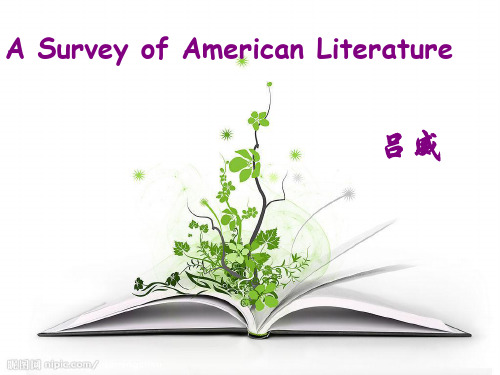
The origin of American Indians
• They were divided into a great number of tribes who spoke different languages. By the 15th century there were 15 to 20 million inhabitants in the Americas, some of them were quite primitive, while others were among the most advanced cultures in the world. But when the Europeans arrived in great numbers in the 16th and 17th centuries, the cultures of the American Indians began to change as they came into contact with Western culture and technology.
&
Mark Twain
SelecteEdarRneesat Hdeimnignsgwiany American Literature
Outline of American Literature ( 6 periods )
[1] Colonial Period ----Puritanism (1607-1775) Chapter 1
?这些英国人在安顿好新家以后为感谢在危难之时帮助支援过他们的印第安人同时也感谢上帝对他们的恩赐是年年11月第四星期四将猎获的火鸡制成美味佳肴盛情款待印第安人并与他们进行联欢庆祝活动持续了三天
Unit7_Rewriting_American_History

Unit 7Rewriting American HistoryFrances FitzGeraldTeaching Tips“Rewriting American History” is an exposition. Fitzgerald is making an argument, so it is important for the students to find out 1) what the author’s arguments are; 2) on what evidence the author bases her arguments; 3) how the author makes these arguments. After understanding the author’s arguments, the students can then evaluate these arguments: 1) are they convincing? and 2) how can I connect these arguments to what I already know about the subject matter? The essay is taken from FitzGerald’s journal articles/book America Revised: History Schoolbooks in the Twentieth Century, so draw your students’ attention to techniques of comparison and contrast and the ways in which FitzGerald assesses current (i.e. 1970s) history textbooks. As FitzGerald is writing about the rewriting of American history, the text contains quite a number of references to U.S. history. Give the students just enough information to enable them to understand the text, but ask them to focus more on how FitzGerald makes her argument.Here are a few suggestions for handling the essay. Ask your students to keep these in mind while scanning the essay: 1) state what the essay is about in one or two sentences; 2) enumerate its major parts in their order and relation and outline these parts; and 3) define the problem or problems the author is trying to solve. In class, you can ask your students to 1) identify and interpret the author’s key words, for example, “rewriting”, “change”, “problems”, “patchwork”, “diversity”, etc.; 2) grasp the author’s leading propositions by dealing with her most important sentences; 3) know the author’s arguments, by constructing them out of sequences of sentences; and 4) determine which of the problems she presents the author has solved, and which she has not. At the end of the week, you can ask your students to assess FitzGerald’s writing and present good reasons for any critical judgment s they make.Structure of the TextPart I Introduction(1) It is hard to imagine history textbooks as being subject to change.Part II American History Schoolbooks RewrittenSection I: changing history textbooks(2-4 ) Examples of changes that have taken place(5) It is not surprising that textbooks reflect changing scholarly research, but the changes remain shocking.Section II: three types of changes that have taken place(6-9) political change: patchwork replacing unity, problems replacing progress(10-11) pedagogical change(12-13) physical changePart III Conclusion(14-15) There is no perfect objectivity, but the problem with constantly changing school history textbooks is that each generation of children reads only its own generation’s textbooks and therefore learns only one particular and transient version of America, which remains their version of American history forever.Outline and Topic Sentences:Part IPara. 1Topic sentence: Those of us who grew up in the fifties believed in the permanence of our American-history textbooks.Transitional sentence: But now the textbook histories have changed, some of them to such an extent that an adult would find them unrecognizable.Part IIPara. 2Topic sentence: One current junior-high-school American history begins with a story about a Negro cowboy called George McJunkin.Example: George McJunkin, Negro cowboy, discovery of remains of an Indian civilization in 1925 →civilizations before European explorersPara. 3Topic sentence: Another history text—this one for the fifth grade—begins with the story of how Henry B. Gonzalez, who is a member of Congress from Texas, learned about his own nationality. Example: Henry B. Gonzalez, question of nationality: birthright or cultural heritage, melting pot vs. salad bowlPara. 4Topic sentence: Poor Columbus! He is a minor character now, a walk-on in the middle of American history.Example: Columbus, prominence in U.S. history fading with time and revision, along with other self-promoting figures in U.S. history.Para. 5Topic sentence: Of course, when one thinks about it, it is hardly surprising that modern scholarship and modern perspectives have found their way into children’s books. Yet the changes remain shocking. Para. 6Topic sentence: The history texts now hint at a certain level of unpleasantness in American history. Examples: the last “wild” Indian captured and displayed, child coal miners of Pennsylvania, cruelty in the American-Filipino War, cruelty of patriots against royalists in the American Revolution, and Japanese internment.Para. 7Topic sentence: Ideologically speaking, the histories of the fifties were implacable, seamless.Para. 8Topic sentence: But now the texts have changed, and with them the country that American children are growing up into.A radical way of reconceptualizing past and future:➢Society: uniform → a patchwork of wealth, ages, gender, and races➢Smooth-running system → a rattletrap affair➢Past future relationship: progress → change➢The present: a haven of scientific advances → a tangle of problemso Examples: problems of consumer society; problems of the poor and aged who depend on social security.o Science and technology still deemed to be the magic bullet for social problems Para. 9Transitional sentence: Even more surprising than the emergence of problems is the discovery that the great unity of the texts has broken.Topic sentence: Whereas in the fifties all texts represented the same political view, current texts follow no pattern of orthodoxy.Examples:➢Portrayal of civil rights: as a series of actions taken by a wise, paternal government vs. the involvement of social upheaval➢Portrayal of the Cold War: having ended vs. continuingPara. 10Topic sentence: The political diversity in the books is matched by a diversity of pedagogical approach. Types:➢Traditional narrative histories➢Focusing on particular topics with “discovery” or “inquiry” texts and chapters like case studies (with background information, explanatory notes and questions) (questions are at the heart of the matter; they force students to think much as historians think, to define the point of view of the speaker, analyze the ideas presented, question the relationship between events, and so on.)o Example: Washington, Jefferson, and John Adams on the question of foreign alliancesPara. 11Topic sentence: What is common to the current texts—and makes all of them different from those of the fifties—is their engagement with the social sciences.Transitional sentence: In matters of pedagogy, as in matters of politics, there are not two sharply differentiated categories of books; rather, there is a spectrum.➢Political and pedagogical spectrum:o politically, from moderate left to moderate right;o pedagogically, from the traditional history sermon, through a middle ground of narrative texts with inquiry-style questions and of inquiry texts with long stretches ofnarrative, to the most rigorous of case-study books➢Engagement with the social scienceso“Concepts” as foundation stones for various elementary-school social-studies series ▪Example: the 1970 Ha rcourt Brace Jovanovich series, “a horizontal base or ordering of conceptual schemes” to match its “vertical arm of behavioralthemes,” from easy questions to hardo History textbooks almost always include discussions of “role,” “status,” and “culture;” some include debates between eminent social scientists, essays oneconomics or sociology, or pictures and short biographies of social scientists of bothsexes and of diverse racesPara. 12Topic sentence: Quite as striking as these political and pedagogical alterations is the change in the physical appearance of the texts.Para. 13Topic sentence: The use of all this art and high-quality design contains some irony.Example of how art transcends the subject matter: child laborers, urban slum apartments, the Triangle shirtwaist-factory fire, junk yards, nuclear testingParagraph summary: Whereas in the nineteenth-fifties the texts were childish in the sense that they were naïve and clumsy, they are now childish in the sense that they are polymorphous-perverse. American history is not dull any longer; it is a sensuous experience.Part IIIPara. 14Topic sentence: The surprise that adults feel in seeing the changes in history texts must come from the lingering hope that there is somewhere out there, an objective truth.Question: why is it disturbing to see the changes in history textbooks?Paragraph summary: The texts, with their impersonal voices, encourage this hope that there is an objective truth, and therefore it is particularly disturbing to see how they change, and how fast. Para. 15Topic sentence: In history, the system is reasonable—except that each generation of children reads only one generation of schoolbooks. The transient his tory is those children’s history forever—their particular version of America.Detailed Analysis of the Text1.Those of us who grew up in the fifties believed in the permanence of our American-history textbooks. (Para. 1)This is the topic sentence of Para. 1. FitzGerald starts her article by talking about how people generally believed that history textbooks would never change. She presents a few reasons why American history textbooks of that era gave the impression that they would never change: they were heavy, solemn, authoritative, imperturbable, and distant. The last sentence of the paragraph is a transitional sentence leading to a discussion of how history textbooks in the 1970s differ from those a generation earlier.2.To us as children, those texts were the truth of things: they were American history.(Para. 1)Translation: 对于儿时的我们来说,历史书就代表了事实真相,因为它们是美国历史。
American History 美国历史 (Since 1900)
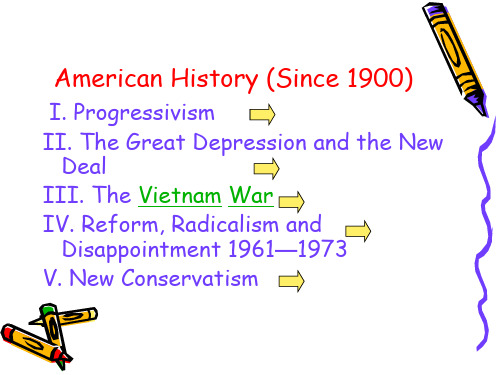
The Progressive Era
• social, political, and economic reform in the early years of the 20th century. Among the topics covered are trust busting, regulation of big business, child labor, urban poverty, the struggle for women’s suffrage, and measures to root out political corruption.
The Progressive Movement: a movement demanding government regulation of the economy and social conditions. It was not an organized campaign with clearly defined goals. Rather, it was a number of diverse efforts at political, social, and economical reforms.
The Muckrakers: a group of reform-minded journalists, made investigations and exposed various dark sides of the seemingly prosperous society.
In the social area, the demands were improved living conditions for பைடு நூலகம்he poor in the cities, the banning of child labor, work hour limit for women workers, and industrial accident insurance.
美国历史文化概况(英文版)UNIT 4 Civil War and Abraham Lincoln
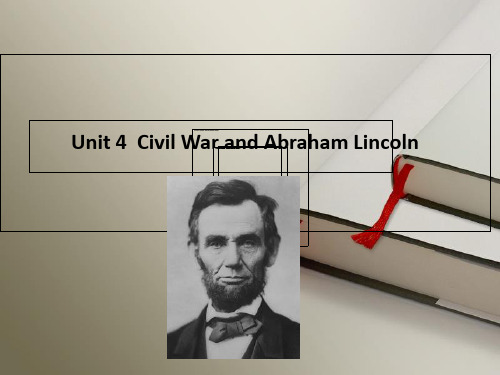
1. After eleven Southern slave states declared their secession from the United States, they formed the Union in the South. ( )
TEXT A Notes
3. Border slave states: In the context of the American Civil War, the term border states refers to the five slave states of Delaware, Kentucky, Maryland, Missouri, and West Virginia, which bordered a free state and were aligned with the Union. All but Delaware share borders with states that joined the Confederacy.
4. The Underground Railroad was an informal network of secret routes and safe houses used by 19thcentury black slaves in the United States to escape to free states and Canada with the aid of abolitionists who were sympathetic to their cause. The term is also applied to the abolitionists who aided the fugitives. Other various routes led to Mexico or overseas. Created in the early 19th century, the Underground Railroad was at its height between 1850 and 1860. One estimate suggests that by 1850, 100,000 slaves had escaped via the "Railroad".
高英 rewriting american history课后题答案
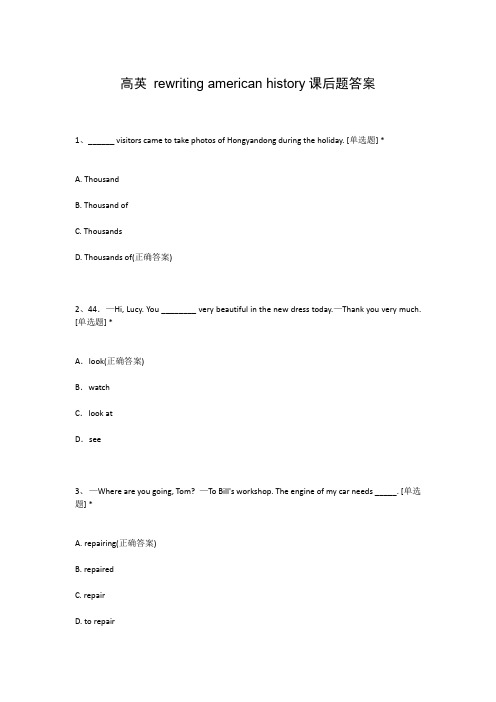
高英rewriting american history课后题答案1、______ visitors came to take photos of Hongyandong during the holiday. [单选题] *A. ThousandB. Thousand ofC. ThousandsD. Thousands of(正确答案)2、44.—Hi, Lucy. You ________ very beautiful in the new dress today.—Thank you very much. [单选题] *A.look(正确答案)B.watchC.look atD.see3、—Where are you going, Tom? —To Bill's workshop. The engine of my car needs _____. [单选题] *A. repairing(正确答案)B. repairedC. repairD. to repair4、I knocked on the door but _______ answered. [单选题] *A. somebodyB. anybodyC. nobody(正确答案)D. everybody5、For more information, please _______ us as soon as possible. [单选题] *A. confidentB. confidenceC. contact(正确答案)D. concert6、I like this house with a beautiful garden in front, but I don't have enough money to buy _____. [单选题] *A. it(正确答案)B. oneC. thisD. that7、A lot of students in our school were born _______ March, 1 [单选题] *A. in(正确答案)B. atC. onD. since8、( ) No matter _____ hard it may be, I will carry it out. [单选题] *A whatB whateverC how(正确答案)D however9、His new appointment takes()from the beginning of next month. [单选题] *A. placeB. effect(正确答案)C. postD. office10、We will _______ Mary this Sunday. [单选题] *A. call on(正确答案)B. go onC. keep onD. carry on11、The language school started a new()to help young learners with reading and writing. [单选题] *A. course(正确答案)B. designC. eventD. progress12、I like booking tickets online,because it is _______. [单选题] *A. boringB. confidentC. convenient(正确答案)D. expensive13、Tom will _______ me a gift from Japan. [单选题] *A. takeB. getC. carryD. bring(正确答案)14、How lovely a day,()? [单选题] *A. doesn't itB. isn't it(正确答案)C.shouldn't itD.hasn't it15、( ) _____ New York _____ London have traffic problems. [单选题] *A. All…andB. Neither….norC. Both…and(正确答案)D. Either…or16、_______ win the competition, he practiced a lot. [单选题] *A. BecauseB. In order to(正确答案)C. Thanks toD. In addition to17、Mr. Brown ______ the football match next week.()[单选题] *A. is seeingB. seesC. sawD. is going to see(正确答案)18、_________ along the old Silk Road is an interesting and rewarding experience. [单选题]*A. TravelB. Traveling(正确答案)C. Having traveledD. Traveled19、53.On your way home, you can buy some fruit, meat, vegetables and ________. [单选题] * A.something else(正确答案)B.else somethingC.everything elseD.else everything20、My sister gave me a _______ at my birthday party. [单选题] *A. parentB. peaceC. patientD. present(正确答案)21、---Excuse me sir, where is Room 301?---Just a minute. I’ll have Bob ____you to your room. [单选题] *A. show(正确答案)B. showsC. to showD. showing22、Sam is going to have the party ______ Saturday evening. ()[单选题] *A. inB. on(正确答案)C. atD. to23、The man called his professor for help because he couldn’t solve the problem by _______. [单选题] *A. herselfB. himself(正确答案)C. yourselfD. themselves24、The travelers arrived _______ Xi’an _______ a rainy day. [单选题] *A. at; inB. at; onC. in; inD. in; on(正确答案)25、She passed me in the street, but took no()of me. [单选题] *Attention (正确答案)B. watchC. careD. notice26、—It’s too noisy outside. I can’t fall asleep.—I can’t, either. We have to ______ new ways to solve the problem.()[单选题] *A. come up with(正确答案)B. get on withC. make up withD. catch up with27、David ______ at home when I called at seven o’clock yesterday evening. ()[单选题] *A. didn’tB. doesn’tC. wasn’t(正确答案)D. isn’t28、He held his()when the results were read out. [单选题] *A. breath(正确答案)B. voiceC. soundD. thought29、95.-Dad, can we walk? ? ? ? ? ? ?the road now?-No,we? ? ? ? ? ? ? ? ? ? . We have to wait until the light turns green. [单选题] *A.across, needn’tB.across, mustn’t(正确答案)C.though, can’tD.through, mustn't30、( ) The Great Wall was listed by the UNESCO as ___ World Heritage Site. [单选题]*A. a(正确答案)B. theC.\D.an。
美国文化American culture
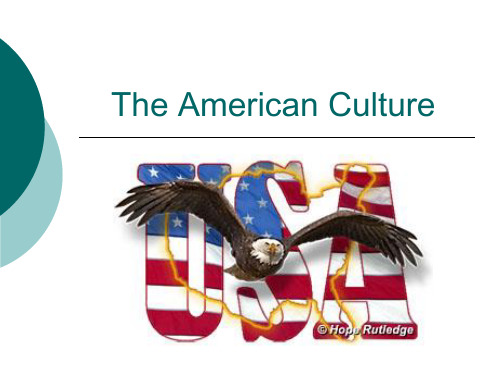
2050 74.0%
46.3% 30.2% 13.0% 7.8%
85%/1960
Flag
Stars = the 50 States Stripes = the 13 colonies
Five famous symbols of American culture
American Civil War
The American Civil War (1861–1865), also known as the War Between the States Eleven Southern slave states formed the Confederate States of America, also known as "the Confederacy." Led by Jefferson Davis, the Confederacy fought against the United States (the Union)
U.S. Census Bureau Population projections
Race/ethnicity Whites
Non-Hispanic Whites Hispanics/Latinos (of any race) African Americans Asian Americans
2010 79.5%
We hold these truths to be self-evident, that all men are created equal, that they are endowed by their Creator with certain unalienable Rights, that among these are Life, Liberty and the pursuit of Happiness.
小学上册第16次英语第6单元自测题(有答案)

小学上册英语第6单元自测题(有答案)英语试题一、综合题(本题有100小题,每小题1分,共100分.每小题不选、错误,均不给分)1.I enjoy playing with my ________ (玩具车) during playtime.2.What is the term for a baby cow?A. CalfB. KidC. LambD. Foal答案: A3.ts have __________ (刺) for protection. Some pla4.environmental monitoring) tracks ecosystem health. The ____5.My brother is a big __________ of basketball. (粉丝)6.My pet is very _______ (活泼).7.The __________ (古代美索不达米亚) is considered the cradle of civilization.8.What do we call a person who studies the relationship between culture and environment?A. Environmental AnthropologistB. SociologistC. Cultural AnthropologistD. Biologist答案: A9. A chemical reaction can result in the formation of new ______.10.The monkey is _____ in the tree. (swinging)11.The __________ (历史的传说) often contain moral lessons.12.On weekends, I like to go ________.13. A sunflower is a type of _______ that grows tall.14.My favorite color is ________.15. A telescope helps astronomers study distant ______.16.My dad makes the best ________ (比萨).17.The __________ (历史的共同创造) enriches narratives.18.The __________ (历史的传承) is vital for future generations.19.The chemical formula for ammonium nitrate is __________.20.My friend is ______ (tall) and funny.21.古代的________ (traditions) 在不同地区有着不同的表现形式。
四川省成都市郫都区名校2022-2023学年高一下学期3月月考英语试题(含答案)

郫都区名校2022-2023学年高一下学期3月月考注意事项:英语试卷1. 本试题分第I 卷(选择题)和第II 卷(非选择题)两部分;2. 本堂考试120 分钟,满分150 分;3. 答题前,考生务必先将自己的姓名、学号填写在答题卡上,并使用2B 铅笔填涂;4. 考试结束后,将答题卡交回。
第I 卷(85 分)第一部分听力(共两节,满分20 分)第一节(共 5 小题;每小题 1 分,满分 5 分)听下面 5 段对话。
每段对话后有一个小题,从题中所给的A、B、C 三个选项中选出最佳选项,并标在试卷的相应位置。
听完每段对话后,你都有10 秒钟的时间来回答有关小题和阅读下一小题。
每段对话仅读一遍。
What does the woman offer to do for the manLook at his X-ray. B. Give him treatment. C. Send him to the hospital.How does the woman feel about the priceExpensive. B. Reasonable. C. Cheap.What is the woman going to doCall Julian Assange.Watch the news on TV.Get information on the Internet.Why didn’t the man finish his science homeworkHe didn’t have enough time.He forgot it completely.He found it difficult.What does the job requireBusiness trips to Italian. B. Excellent Spanish. C. Native Germans.第二节(共15 小题;每小题 1 分,满分15 分)听下面 5 段对话或独白。
英美文化课本习题答案

英美文化教材习题答案Britain1. Who are the British ?Ⅰ1.the Scottish Highlanders: They are the Scots who live in the mountain areas of the Highlands in Northern Scotland. They are a proud, ind ependent and hardy peopl e who maintain their strong cultural id entity.2.the British Isles: The British Isl es lie northern of Europe in the Atlantic Ocean. They consist of two large islands-Britain and Ireland and several small islands.3.the National Eisted dfod: Eisted dfod is the Welsh word for “sitting”. National Eisted dfod is t he most famous festival of music and verse in Wales. It takes place each August and lasts for about a week. The highlight of the Eisted dfod is a competition for the best epic poem about Wales written and read in Welsh. The winner is crowned Bard, consid ered the supreme honor in Wales.4.Bard: “Bard”originally d enoted the grouping epic poem to the Celtic l ead ers or warriors for their great achievement. Now, it roughly means the respected poetry.5.Northern Ireland (Ulster): A section of the United Kingd om of Great Britain and the Northern Ireland, l ocated in the northeast of the Ireland, the capital of which is Belfast.6.Oliver Cromwell: Oliver Cromwell was the Roundhead l ead er during the English Civil War. Hed efeated King Charl es Ⅰ and cond emned him to d eath. The monarchy was overthrown, and the country became for more than ten years a republic.7.William Ⅲ: the protestant King (参见P10-11)8.The Orange Day celebrations: cel ebrations hel d by Protestants on 12 August each year in North Ireland to commemorate the Battle of the Royne in 1690 when the Protestant King William of Orange crushed a Catholic rebellion in Lond ond erry. The celebrations were always aggressively provocative and fightings often broke out between Protestant marches and Catholic bystand ers.9.The Provisional IRA: IRA, the Irish Reputation Army, is a nationalist organization d edicated to the unification of Ireland. It was organized in1919. The IRA refused to accept a separate Northern Ireland und er British rul e. In 1969 it s plit into an “official” majority, which disclaimed viol ence, and a terrorist “provisional” wing, whose attacks on British troops in Northern Ireland, rand om bombings, and others acts of terror in England kept tensions high.10. The Peace People: In the summer of 1976 Betty Williams, a Protestant housewife, was so horrified at the killing fo two children by a running IRA car that she decid ed to organize the women of Ulster, both Protestant and Catholic, into a pressure group. It is a pressure group working for peace and reconciliation in Ireland. Williams and her Catholic partner, Corrigan, soon gathered thousands of foll owers d espite threats and intimidation from both sid es. They continued to pursue their aims and at the end of 1976 the two l ead ers were award ed the Nobel Prize for Peace.Ⅱ1.The full name of the United Kingd om is the United Kingd om of Great Britain and the Northern Ireland.2.The Romans first land ed in Britain in the year of 55BC.3.The Scots are well-known for being inventive, hard-working, serious mind ed and cautious with money.4.Two of the Welsh characteristics are cultural prid e and their l ove of music and poetry.5.Peopl e began to settle in about 10,000 years ago. two famous Scottish writers: Robert Burns and Sir Walter Scottor, two Welsh writers: Dylan Thomas and Gwyn Thomas; and two Irish writers: Jonathan Swift and Oscar Wild e.7.Angl es, Saxons and Jutes were the three Germanic tribes that came to be the basis of mod ern English race.ⅢDDBAB2. English HistoryⅠ1.Exercise book Page29 12.Page29 23.Page29 34.Page29 65.Page30 96.Henry ⅧTextbook P28 2nd para.7.Elizabeth Ⅰ Textbook P29 1st para.8.Divine Right Textbook P30 2nd para. (可忽略)9.Page33 2210.VictorianismⅡ1.The Crusad es2.Columbus, Vasco da Gama3.the Mid dl e ages4.the Parliament, the King Charl es Ⅰ5. Charl es Darwin6. the Great Depression7. the League of Nations, United NationsⅢDBBCD4.British Government SystemI.1.学习手册63页III.12.学习手册65页III.93.学习手册65页III.104.学习手册64页III.35.学习手册64页III.46.学习手册64页III.77.学习手册64页III.5II.1. Elizabeth the Second2. On Her Majesty’s Service3. the Most Ord er of the Garter4. In her rol e as head of the Church of England5. Acts of Parliament; the Prerogative of the Crown;Conventions of the Constitution; Common law; Parliamentary Privilege6. Five, 6357. The Crown; the House of Lords; the House of Commons8. Parliament9. The final court of appeal in civil cases and criminal cases, except criminal cases in Scotland.10. To make laws;to control and criticize the executive government;to control the raising and the spending of money11. The Lord Chancellor12. Her ministers13. Parliament; Cabinet; the House of Commons; Parliament III. BCADCAIV.1.课本P68 第二段2.课本P75 第二,四段P74 第三段3.课本P764.课本P78 第一段5.课本P81 第三段6.课本P737.课本P78 第一,二段5.Industry, Agriculture and BusinessⅠ1.Exercise book Page80 12.P80 23.P81 64.P82 85.Special d evelopment area: Textbook P101 2nd para.6.P81 37.P81 48.P81 7Ⅱ1. coal, water power2. the Second Worl d War, the Bank of England, coal, civil aviation3. the Second Worl d War, Labour4. a nation of shop-keepers5. the discovery and exploitation of oil and gas in the North Sea.ⅢADCAA6.English LiteratureI.1.学习手册96页. III.22.学习手册96页. III.33.学习手册96页. III.44.学习手册97页. III.55.课本124页. 第二,三段6.学习手册96页. III.77.学习手册96页. III.8II.1. Beowulf;the 6th2.their Viking raid ers swept into Britain3.the Anglo-Saxon Chronicle;The Roman invasion of Britain in 54B.C.The mid dl e of the 12th century4.Chaucer; Shakespeare; Milton5.Thomas More; Utopia6.Romeo and Juliet; Hamlet; Othello; The Tempest; Twelfth Nights; As You Like It; Richard III; Richard II; Julius Caesar7.The Essays8.Paradise Lost; Paradise Regained; Samson Agonistes9.Pilgrim’s Progress10.Jonathan Swift11.His poems London and The Vanity of Human Wishes12.Robert Burns13.Robinson Cruise14.William Wordsworth; Samuel Tayl or Col eridge; Lord Byron; John Keats; Percy Bysshe Shell ey15.Jane Austen; Anne Bronte; Emily Bronte16.Louis Stevenson; Lewis Carroll; William Makepeace Thackeray;David Copper field; Oliver Twist;George Eliot; Oscar Wilde;The Return of the Nation; Jude the Obscure17.James Joyce; Ulysses18.George Bernard ShawIII. DBCAADAADDIV.1.课本P115-1162.课本P122-1233.课本P1334.课本P135 第二,三段8.Religion and BeliefsExplain the foll owing in English: 全部在学习手册P109.Fill the blanks:1)Roman Catholic; Protestant2)The Old Testament; the New Testament.3)Queen; the Archbishop of Canterbury.4)God; Jesus; the Holy Spirit.5)Presbyterian6)The Pope in Rome and the church or priesthood.7)The Presbyterian; the Methodist Church; the Congregational Church; the Baptist Church; theQuakers.8)Humbl er forms of life.Answer the questions:1)学习手册P106 13、14题2)P146 第三段3)P148 第二段4)P150 第一段cationExplain the foll owing in English:1) 2) 3) 6) 7) 8)是学习手册P140、P141和P142的1.3.4.7.8.11题4) 5)在书本P171 第二段Fill the blanks:1) 5;15.2)Christmas; Easter; summer.3)The selective; the comprehensive4)Eton; Harrow; Rugby.5)About three-quarters of income of Britain University.6)Oxford; Cambridge.7)St Andrews; Glasgow (or Aberd een; Edinburgh)8)Oxford.9)Leeds; Lancaster (any acceptabl e answers are correct)10)Exclusiveness.Tick the correct answer in each of the foll owing:A C D DAnswer the questions:1)Both educational and social grounds2)P171第二段3)学习手册P148或P137 的24题4)书本P174最后一段和P175最开头一段5)课本P175-1776)The coll ege system and the tutorial system.7)P178最后一段11.The press, Radio and TelevisionExplain the foll owing in English:1) 2) 3) 4) 5) 在学习手册P1666)书本P198 第二段的7)书本P204 第三段Fill the blanks:1)the smallness of the country2)Quality paper; popular paper.3)The Times; The Guardian; the Daily Telegraph; Daily Mail; Daily Mirror; Sun.4)Thomson5)The Conservative Party; the Liberal Party6)Daily Telegraph7)The Sunday Times; Observer.8)Daily Mirror; The Sun.Tick the correct answer in each of the foll owing: D B C B AAnswer the questions:1) 学习手册P1742) 书本P201最后一段书本P206 最后一段America1.Atlantic to PacificⅠ.1.学习手册第196 页2.课本第237页2nd para.3.学习手册第197 页4.课本第237页1st para & 第246页注释175.学习手册第196 页6.学习手册第197 页7.课本第239页最后一段& 第240页第一、二段8.课本第242页最后一段& 第247页注释26Ⅱ. Fill in the blanks1. 50, 13, 35, Hawaii, Alaska2.Alaska, California3.Eastern standard time, central standard time, mountain standard time, pacific standard time4.Connecticut, Massachusetts, Maine, New Hampshire, Vermont, Rhod e Island5.West Virginia, New York State, New Jersey, Pennsylvania, Maryland6.The Potomac, Washington D.C7.The Appalachian, Vermont, Canada8.The Appalachian, Rocky9.Washington State, Oregon, California10.New England, the Mid-Atlantic area, the South, the Mid-West, the Great Plains states, the Western and the Pacific coast statesⅢ. Tick the correct answer in each of the foll owing:C AD D C CⅣ. Answer the questions:1.学习手册第191, 196 页2.学习手册第196 页3.学习手册第196 页4.课本第237 页5.课本第239 页6.学习手册第198 页,课本241 页2. AMERICAN HISTORYExplain the foll owing in English:(其余未注明的页码是学习手册页码)1.P218.5(学习手册218页第五条)2.P280.9 (课本280页第九个注释)3.P221.154.P222.175.P221.146.P222.167.P222.188.P223.209.P224.2610.P225.2811.P226.3312.P227.3513.P228.3814.P228.4015.P223.22Fill in the blanks:1.Icelandic Vikings, Columbus2.Jamestown Virginia, 16073.English Puritans, Roman Catholics, The Quaker l ead er William Penn4.1775, 17835.a second continental Congress6.July 4th7.the Fed eralists, the Republicans, classes, id eol ogical lines8.Thomas Jefferson9.John Marshall10.Uncl e Tom’s Cabin11.put an end to slavery, d ecid ed that America is a singl e indivisibl e nation12.he introduced the assembly line into automobil e production, Manufacturing the Mod el T13.the New York Stock Exchangeissez-faire, the government shoul d interfere with business as little as possibl e, government action15.Eugene V. DebsTick the correct answer in each of the foll owing:1-10:BAAADADADBAnswer the questions:(课本页码)1.P2522.P2533.P2544.P2575.P2586.P264-p2657.P266-p2678.P268-p2699.P270-p27110.P27311.P27512.P276-p2773.THE FORMS OF GOVERNMENTExplain the foll owing in English:(未标注页码为学习手册页码)1.P245.52.P245.63.P246.74.P246.95.P247.116.P247.127.P247.138.P311.3(课本)9.P246.810.P240.1211.P314.23(课本)Fill in the blanks:1.fed eralism, the separation of powers, respect for the Constitution and the rul e of law2.foreign affairs, matters of general concern to all the states3.the Democrats, the Republicans4.executive, l egislature, judicial5.Ford, Rockefell er, the Presid ent Nixon resigned when he was in power6.Vice-Presid ent7.four, four, John Kenedy8.two terms(eight years)9.435, 2, 100, 610.the Congress(both the Senate and the House of Representatives), the Senate, a two-thirds majority in both Houses11.Confed eration12.192213.The Supreme Court14.life, Presid ent, the Senate15.The Fed eral Bureau of InvestigationTick the correct answer in each of the foll owing:1-8: ACDCADCBAnswer the questions:(课本页码)1.P2882.P2883.P2914.P294&(p314.29)5.P3026.P3037.P290, p297, p3078.P302-p3034. American LiteratureⅠ. Explain the foll owing in English:1.学习手册第268 页2.学习手册第268 页3.学习手册第268 页4.学习手册第269 页5.学习手册第270 页6.学习手册第273 页7.学习手册第274 页Ⅱ. Fill in the blanks1. Washington Irving, Fennimore Cooper2.Edgar Allan Poe, The Fall of the house of Usher3.(Concord, Massachusetts), Ralph Wald o Emerson,Henry David Thoreau, Nathaniel Hawthorne4.Nature, The American Scholar, Self-Reliance, Experience5.Walden6.The Scarlet Letter7.Herman Melville8.The Adventures of Tom Sawyer, Life on the Mississippi, The Adventures of Huckleberry Finn9.Theodore Dreiser10.The Great Gatsby, what had happened to American life11.John Dos Passos12.A Fable, Light in August, The Hamlet13.The Sun Also Rise, A farewell to Arms, For Whom the Bell Tolls14.John Steinbeck, Ralph Ellison15.Eugene O’Neill, Long Day’s Journey into NightⅢ. Tick the correct answer in each of the foll owing:CADBD DCCAD BCⅣ. Answer the questions:1.学习手册第258,267(explanation 1) 页2.Both are 19th-century writer. Both are also a poet and journal keeper.3.学习手册第269(2) 页4.课本第2326 页5.5. ReligionⅠ. Explain the foll owing in English:1.学习手册第293 页2.学习手册第293 页3.学习手册第294 页4.学习手册第294 页5.学习手册第291 页Ⅱ. Fill in the blanks1.four-fifths, majority hardly, half2.U.S3.Against the Constitution4.The Baptists, the Methodists5.Roman Catholics, the Baptists, The Methodists, Presbyterians6.John F. KennedyⅢ. Tick the correct answer in each of the foll owing:ACDCAⅣ. Answer the questions:1.课本第345 页(4-9行)2.课本第345(最后一段)页3.课本第346(第二段)页4.可参阅课本359页Notes6、7、8、9所对应的句子。
美国历史american history

The federal government only has the power to do what it says in the Constitution. All other powers are given to the states and to the people.
Federal (National) & State Government
This belief was used to justify wars against native Mexicans and Indians, as the whites moved westward.
“Manifest Destiny”
Over the next century, thousands of families traveled west to build new settlements. This was the beginning of the
After
The U.S. U.S. Constitution is the supreme law of the United States of America. The Constitution organizes the American government, and organizes relationships between the national government, the state’s governments, and the people.
Federal (National) & State Government
This kind of government is known as federalism(联邦主义). In a federal government, right to rule is divided between a central authority (the nation) and smaller political units (the states).
大三上学期英美概况UK-geography, people, and language

Wales: It’s mostly mountainous. South Wales is less mountainous
than North and Mid Wales.
Northern Ireland: It’s mostly hilly.
Northern Ireland and Ireland
Lake poets
The waves beside them danced; but they Out-did the sparkling waves in glee: A poet could not but be gay, In such a jocund company: I gazed---and gazed---but little thought What wealth the show to me had brought: For oft, when on my couch I lie In vacant or in pensive mood, They flash upon that inward eye Which is the bliss of solitude; And then my heart with pleasure fills, And dances with the daffodils.
The River Thames
Landmarks & Symbols of London
Location and territory
Location of the UK:
The mainland areas lie between latitudes 49°N and 61°N and longitudes 8°W to 2°E
小学上册第3次英语第5单元真题试卷
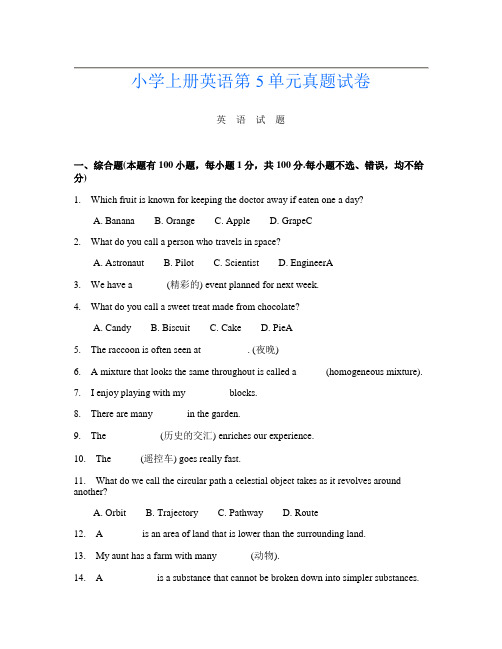
小学上册英语第5单元真题试卷英语试题一、综合题(本题有100小题,每小题1分,共100分.每小题不选、错误,均不给分)1.Which fruit is known for keeping the doctor away if eaten one a day?A. BananaB. OrangeC. AppleD. GrapeC2.What do you call a person who travels in space?A. AstronautB. PilotC. ScientistD. EngineerA3.We have a ______ (精彩的) event planned for next week.4.What do you call a sweet treat made from chocolate?A. CandyB. BiscuitC. CakeD. PieA5.The raccoon is often seen at _________. (夜晚)6. A mixture that looks the same throughout is called a _____ (homogeneous mixture).7.I enjoy playing with my ________ blocks.8.There are many ______ in the garden.9.The __________ (历史的交汇) enriches our experience.10.The _____ (遥控车) goes really fast.11.What do we call the circular path a celestial object takes as it revolves around another?A. OrbitB. TrajectoryC. PathwayD. Route12. A _______ is an area of land that is lower than the surrounding land.13.My aunt has a farm with many ______ (动物).14. A __________ is a substance that cannot be broken down into simpler substances.15.What do we call a story that teaches a lesson?A. FableB. NovelC. PoemD. BiographyA16.Which animal can fly?A. ElephantB. DogC. BirdD. FishC17.How many players are on a baseball team?A. NineB. TenC. ElevenD. Twelve18.The ______ helps with the growth of plants.19.My cousin is a talented ____ (guitarist).20.I play with my ________ (玩具名称) during recess.21.I love to _____ (explore) different types of plants.22. A garden can bring ______ (快乐) to families.23.What is the main purpose of a fire extinguisher?A. To start firesB. To put out firesC. To light firesD. To control firesB24.The chemical formula for hydrochloric acid is __________.25. A lizard can ______ its tail.26.We have a _______ (考试) next week.27.The _____ (灌溉) method can change the health of crops.28.What do you call a baby horse?A. ColtB. FoalC. KidD. Lamb29.The ________ makes a sweet noise.30.Sound travels through ______ (air).31.What is the opposite of "big"?A. HugeB. SmallC. TallD. Large32.The girl sings very ________.33.What do we call a person who makes films?A. DirectorB. ProducerC. FilmmakerD. All of the above34.My brother loves __________ (音乐) and plays guitar.35.The ______ teaches us about world cultures.36.The __________ (大萧条) caused widespread unemployment in the 1930s.37.My sister is good at playing ____ (board games).38. A supernova can outshine an entire ______ for a short time.39.The mantis is known for its unique ______ (姿势).40.The fish _____ in the aquarium. (swim)41.Where do fish live?A. TreesB. WaterC. LandD. Sky42.What do you call the part of the plant that grows underground?A. StemB. LeafC. RootD. Flower43.__________ are used in the textile industry for dyeing.44.The ________ (社区活动) fosters connections.45.The tree is ___ (tall/short).46.My _____ (玩具赛车) is very fast.47. A desert has very little __________.48.My friend is __________ (总是乐于助人).49.What is the name of the famous playwright from England?A. Charles DickensB. Mark TwainC. William ShakespeareD. Ernest HemingwayC50.The ______ is a predator of many small animals.51.My brother always makes me ____.52.What do you call the process of making a copy of a document?A. PrintingB. ScanningC. DuplicatingD. CopyingD53.She is ___ her lunch. (eating)54. A ____ can often be found resting in the shade.55.I see _____ flying over the flowers.56.Planting trees is a great way to combat ______ (全球变暖).57. A solution that has an equal concentration of hydrogen ions and hydroxide ions is ________.58. A reduction reaction involves the ______ of electrons.59.We need to ______ (clean) our room.60.What do we call the process of animals adapting to their environment?A. EvolutionB. MigrationC. TranspirationD. HibernationA Evolution61.What do you call a story that is made up?A. Non-fictionB. BiographyC. FictionD. HistoryC62.My dad is my superhero and _______ (我爸爸是我的超级英雄和_______).63.The __________ (奴隶制) was a significant part of American history until the Civil War.64.My dad is very ________.65.The dog is _____ (wagging/sitting) its tail.66.What is the name of the famous waterfall in Africa?A. Niagara FallsB. Angel FallsC. Victoria FallsD. IguazuFallsC Victoria Falls67.My sister loves to ________ stories.68. A tiny ___ (小蜜蜂) visits many flowers.69.What is the name of the famous ancient city in Iraq?A. NinevehB. BabylonC. UrD. All of the above70.I have _____ (ten/twenty) fingers.71.The smallest unit of an element is called an _____.72.My favorite game to play with friends is __________ because it's so much fun.73.What is the chemical symbol for hydrogen?A. OB. HC. HeD. NB74.What is the name of the famous detective in Arthur Conan Doyle's stories?A. Hercule PoirotB. Sam SpadeC. Sherlock HolmesD. Philip Marlowe75.What is the capital of Japan?A. OsakaB. KyotoC. TokyoD. Hiroshima76.Let’s go ________ to eat ice cream.77.My ________ (玩具名称) is a great partner for learning.78.She is a _____ (科学家) who studies the environment.79.What is the main ingredient in chocolate?A. CocoaB. VanillaC. SugarD. MilkA80.I have a special ________ that I cherish.81.The ______ (青蛙) can change color depending on its environment.82.What is the process called when a star collapses under its own gravity?A. SupernovaB. Black Hole FormationC. Red Giant PhaseD. Stellar Evolution83.The _______ of a wave can be visualized on a graph.84.What shape is a basketball?A. SquareB. CircleC. TriangleD. Rectangle85.Can you help me ________ my homework?86.The three states of matter are solid, liquid, and ______.87.My __________ (玩具名) is always __________ (形容词).88. A weak base has a pH closer to ______.89.Which holiday celebrates the birth of Jesus?A. ThanksgivingB. HalloweenC. ChristmasD. EasterC90.The ________ has a strong smell.91.The Earth's magnetic field protects us from harmful ______ from space.92.I want to _______ (学习) how to code.93.The ______ (海洋植物) contribute to ocean health.94.Which animal has a pouch for carrying its young?A. DogB. CatC. KangarooD. TigerC95. A ____(food security) ensures access to sufficient food.96.My grandpa tells great ____.97.The ______ contributes to the ecosystem.98.She is _______ (whispering) a secret to her friend.99.What is the term for removing the outer layer of something?A. PeelingB. CuttingC. ChoppingD. SlicingA100.What do we call the protective covering of an egg?A. ShellB. YolkC. AlbumenD. Membrane。
小学上册第十五次英语第3单元真题(有答案)
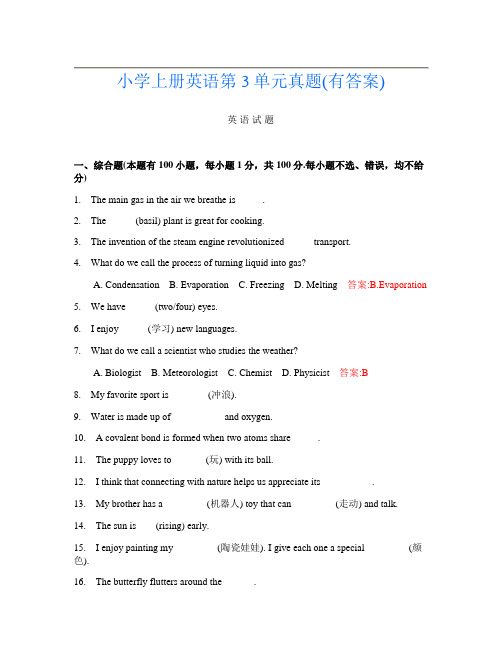
小学上册英语第3单元真题(有答案)英语试题一、综合题(本题有100小题,每小题1分,共100分.每小题不选、错误,均不给分)1.The main gas in the air we breathe is _____.2.The _____ (basil) plant is great for cooking.3.The invention of the steam engine revolutionized _____ transport.4.What do we call the process of turning liquid into gas?A. CondensationB. EvaporationC. FreezingD. Melting答案:B.Evaporation5.We have _____ (two/four) eyes.6.I enjoy _____ (学习) new languages.7.What do we call a scientist who studies the weather?A. BiologistB. MeteorologistC. ChemistD. Physicist答案:B8.My favorite sport is _______ (冲浪).9.Water is made up of __________ and oxygen.10. A covalent bond is formed when two atoms share _____.11.The puppy loves to ______ (玩) with its ball.12.I think that connecting with nature helps us appreciate its __________.13.My brother has a ________ (机器人) toy that can ________ (走动) and talk.14.The sun is ___ (rising) early.15.I enjoy painting my ________ (陶瓷娃娃). I give each one a special ________ (颜色).16.The butterfly flutters around the ______.17.What do you call the study of human societies and cultures?A. SociologyB. AnthropologyC. PsychologyD. Political science答案:B18.We will have a ___. (picnic) next week.19. A _______ is a device used to measure the concentration of a solution.20.What is the name of the famous lion in "The Lion King"?A. SimbaB. MufasaC. ScarD. Nala答案:A21.I enjoy playing ______ during the holidays.22.The __________ (奴隶制) was a significant part of American history until the Civil War.23.I enjoy cooking with my family. We often make __________ together.24.The green _____ has sharp thorns.25.听录音,把图片与颜色连起来。
小学上册第十四次英语第4单元寒假试卷
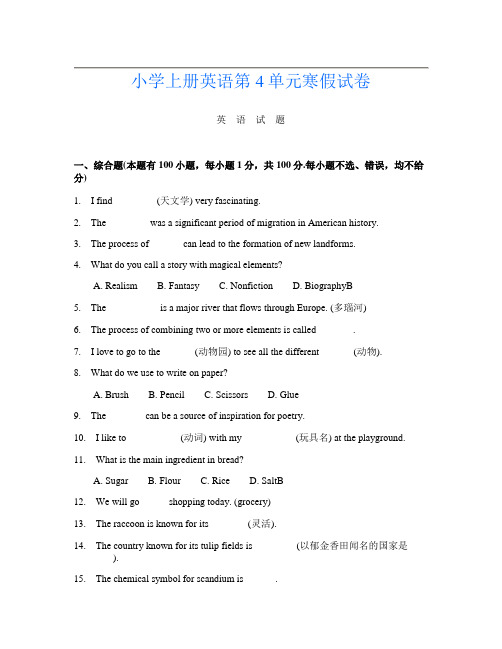
小学上册英语第4单元寒假试卷英语试题一、综合题(本题有100小题,每小题1分,共100分.每小题不选、错误,均不给分)1.I find ________ (天文学) very fascinating.2.The ________ was a significant period of migration in American history.3.The process of ______ can lead to the formation of new landforms.4.What do you call a story with magical elements?A. RealismB. FantasyC. NonfictionD. BiographyB5.The __________ is a major river that flows through Europe. (多瑙河)6.The process of combining two or more elements is called _______.7.I love to go to the ______ (动物园) to see all the different ______ (动物).8.What do we use to write on paper?A. BrushB. PencilC. ScissorsD. Glue9.The _______ can be a source of inspiration for poetry.10.I like to __________ (动词) with my __________ (玩具名) at the playground.11.What is the main ingredient in bread?A. SugarB. FlourC. RiceD. SaltB12.We will go _____ shopping today. (grocery)13.The raccoon is known for its _______ (灵活).14.The country known for its tulip fields is ________ (以郁金香田闻名的国家是________).15.The chemical symbol for scandium is ______.16.The concept of ecological restoration focuses on revitalizing damaged ______.17.The movie was very ________.18.What is the capital of Italy?A. FlorenceB. MilanC. VeniceD. Rome19.The first successful heart valve replacement was performed in ________.20.We take a _____ to school every day. (bus)21.The rain is _____ on the roof. (falling)22.What is the hardest natural substance on Earth?A. GoldB. DiamondC. IronD. Silver23.What do we call the flat part of a book where the pages meet?A. SpineB. CoverC. MarginD. Edge24.The _____ (鸟) is singing.25.My cat likes to chase after a ________.26.The seahorse is unique because it is one of the few species of ________________ (鱼) that exhibits reverse sexual roles.27.The flowers in the garden are very _______ and bright.28.Sound waves can be classified as longitudinal or ______.29.The capital of Sri Lanka is _______.30.What is the largest planet in our solar system?A. EarthB. MarsC. JupiterD. VenusC31. A _____ (植物) may have medicinal properties.32.In the periodic table, elements are organized by their ________ properties.33.My sister is my best _______ because we have fun together.34.The _______ (The American Revolutionary War) was a fight for independence from Britain.35.What do you call the process of converting food into energy?A. DigestionB. RespirationC. AbsorptionD. ExcretionA36.My favorite flower is a ______ (向日葵). It always faces the ______ (太阳).37.The tree is _______.38.She has a ________ (vision) for the future.39.My dad is a __________ (专业人士).40.I like to fly ______ (kites) in the park.41.helps plants to __________ (生长). Sunlight42.What do you call the study of the human body?A. BiologyB. AnatomyC. PhysiologyD. Medicine答案:B43.The ancient Egyptians utilized ________ for artistic expressions.44.__________ is the process of combining substances to create new ones.45.The __________ is found between Europe and Asia. (乌拉尔山脉)46.What do we call the process by which plants make their food?A. DigestionB. TranspirationC. PhotosynthesisD. FermentationC47.The artist, ______ (艺术家), expresses emotions through his work.48.What is the name of the famous American president known for his "New Deal"?A. Franklin D. RooseveltB. Theodore RooseveltC. Harry S. TrumanD. John F. KennedyA49.The __________ (历史遗址) tell stories of the past.50.Newton's first law is about inertia and ______.51.Plants can also _____ (提供) food for animals.52.We are going to ______ a cake for her birthday. (make)53.Where do fish live?A. On landB. In treesC. In waterD. In the air54. A reaction that produces carbon dioxide and water is known as ______ combustion.55.My favorite dessert is _______ (蛋糕).56.I like to eat _____ (apples).57.How many players are on a soccer team?A. 10B. 11C. 12D. 1358.I have a _______ (surprise) for my friend.59.My dog has a very ______ (友好的) temperament.60.The element with the symbol Ag is __________.61.What do we call the process of cooking food using steam?A. BoilingB. SteamingC. FryingD. BakingB62.The chemical symbol for thulium is ____.63.She has a ___ (happy/sad) expression.64.The ______ (海豚) communicates with clicks and whistles.65.Some stars are in binary systems, orbiting around a common _______.66.When it’s sunny, I wear my ______ (太阳镜) and enjoy the warm weather outside. Sunlight makes me feel ______ (快乐).67.The ________ (土壤结构) affects root growth.68.I want to _____ (understand) how plants grow.69.What do we call a baby kangaroo?A. JoeyB. CalfC. KitD. CubA70.What is the name of the famous ancient city in Greece?A. AthensB. CorinthC. DelphiD. All of the above71.What do we call the study of living things?A. ChemistryB. BiologyC. PhysicsD. GeographyB Biology72.On my birthday, I want a ______.73.The chemical formula for sodium chloride is _______.74.The ________ was a famous leader known for his military strategies.75.What is the fastest land animal?A. LionB. CheetahC. HorseD. GazelleB76.What is the name of the famous scientist who discovered the laws of motion?A. Albert EinsteinB. Isaac NewtonC. Galileo GalileiD. Charles DarwinB77.What do you call a person who studies the weather?A. MeteorologistB. ClimatologistC. GeologistD. Chemist78. A ________ (植物研究者) studies plant behavior.79.My brother is a ______. He enjoys playing the drums.80.My sister enjoys practicing ____ (martial arts).81. A ______ (养护) schedule keeps plants healthy.82. A __________ is a geological feature that can be shaped by human activity.83.What is the primary ingredient in a cake?A. FlourB. SugarC. EggsD. Milk84.My uncle is a skilled ____ (potter).85.小狮子) plays with its cubs. The ___86.What is the capital of Tajikistan?A. DushanbeB. BishkekC. TashkentD. AshgabatA87. A rabbit can have many ______ (小兔子) each year.88.What is the sound of a cat?A. MooB. BarkC. MeowD. QuackC89.How many days are in a week?A. FiveB. SevenC. TenD. Twelve90.The castle is _______ (old) and beautiful.91.What do we call the process of making bread rise?A. KneadingB. ProofingC. BakingD. Mixing92.Which month has Valentine's Day?A. JanuaryB. FebruaryC. MarchD. April93.What is the name of the famous American singer known for her hit song "I Will Always Love You"?A. Mariah CareyB. Whitney HoustonC. Celine DionD. AdeleB94.I believe in setting goals. This year, my goal is to __________.95.What do you call a young gopher?A. KitB. PupC. CalfD. Cub96.My ______ loves to dance.97.Objects that float in water are ______ than water.98.My favorite thing about school is ________.99.My hamster loves to burrow in its ______ (垫料).100. A ______ is a type of animal that can hop.。
小学下册T卷英语第3单元全练全测
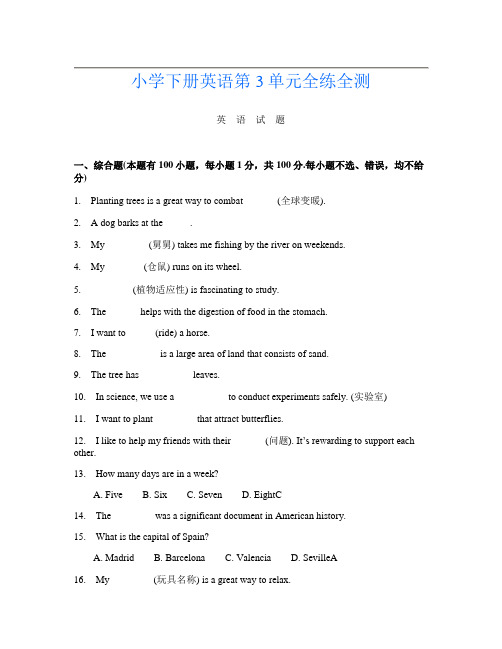
小学下册英语第3单元全练全测英语试题一、综合题(本题有100小题,每小题1分,共100分.每小题不选、错误,均不给分)1.Planting trees is a great way to combat ______ (全球变暖).2. A dog barks at the _____.3.My ________ (舅舅) takes me fishing by the river on weekends.4.My _______ (仓鼠) runs on its wheel.5.________ (植物适应性) is fascinating to study.6.The ______ helps with the digestion of food in the stomach.7.I want to _____ (ride) a horse.8.The __________ is a large area of land that consists of sand.9.The tree has __________ leaves.10.In science, we use a __________ to conduct experiments safely. (实验室)11.I want to plant ________ that attract butterflies.12.I like to help my friends with their ______ (问题). It’s rewarding to support each other.13.How many days are in a week?A. FiveB. SixC. SevenD. EightC14.The ________ was a significant document in American history.15.What is the capital of Spain?A. MadridB. BarcelonaC. ValenciaD. SevilleA16.My ________ (玩具名称) is a great way to relax.17.The _______ (Industrial Revolution) began in the 18th century in Britain.18.What is the color of a ripe banana?A. GreenB. YellowC. BrownD. RedB19. A snake is long and ______.20.What is the main ingredient in vinegar?A. AlcoholB. WaterC. Acetic acidD. Sugar21.What do you call a person who studies sociology?A. SociologistB. AnthropologistC. PoliticianD. HistorianA22.The _______ (小山羊) jumps from rock to rock.23.The _______ (小肉桂) has a distinct smell and flavor.24._____ (树根) prevent soil erosion.25.She is ________ her favorite song.26.The __________ (古代中国) was known for inventions like paper and gunpowder.27.What is the name of the holiday celebrated on December 25th?A. HalloweenB. ThanksgivingC. ChristmasD. EasterC28.What is the color of a traditional school bus?A. BlueB. YellowC. GreenD. RedB29.What is the name of the famous scientist known for his work on electromagnetism?A. James Clerk MaxwellB. Nikola TeslaC. Thomas EdisonD. Michael FaradayA30.Chemical reactions can be classified as ______ or physical changes.31.What do you use to write on a blackboard?A. PencilB. CrayonC. ChalkD. Marker32.__________ are found on the right side of the periodic table.33.She wants to be a _____ (doctor/teacher) when she grows up.34.What do we call the main character in a story?A. AntagonistB. ProtagonistC. HeroD. VillainB35.The sea horse is a unique kind of _________ (鱼).36.The concept of climate change mitigation aims to reduce greenhouse gas ______.37.The ______ (阳光明媚的日子) is perfect for gardening activities.38.What do we call the force that pulls objects toward the Earth?A. MagnetismB. GravityC. FrictionD. InertiaB39.How many teeth does an adult human usually have?A. 20B. 24C. 28D. 32D40.What is the currency used in the United States?A. EuroB. DollarC. YenD. Pound41. A gecko can climb ______ (墙).42.Which insect is known for its ability to make honey?A. AntB. BeeC. FlyD. MosquitoB43.ts can survive in very ______ conditions. (有些植物可以在非常恶劣的条件下生存。
小学下册U卷英语第4单元测验卷[有答案]
![小学下册U卷英语第4单元测验卷[有答案]](https://img.taocdn.com/s3/m/f81e6e8e80c758f5f61fb7360b4c2e3f5627257e.png)
小学下册英语第4单元测验卷[有答案]英语试题一、综合题(本题有100小题,每小题1分,共100分.每小题不选、错误,均不给分)1.The ________ was a significant event in American history.2.Which animal is known for its ability to fly?A. FishB. BirdC. FrogD. Horse答案:B3.The first African American to win a Nobel Prize was _______.4.What do you call a baby kangaroo?A. JoeyB. CalfC. KittenD. Pup答案:A5.My ________ (玩具名称) has wheels and can roll.6.I enjoy ________ (gardening) with my mom.7.What is the main function of our brain?A. Pump bloodB. Digest foodC. Control body functionsD. Respiration答案:C8.What is the largest land animal?A. LionB. GiraffeC. ElephantD. Hippo答案:C9.What is the process by which plants take in sunlight?A. RespirationB. PhotosynthesisC. EvaporationD. Transpiration10. f Exploration began in the _____ century. The Age11.My dad _____ a new car last week. (bought)12.The ______ (狼) is often portrayed as a villain in stories.13.My mom loves to read __________ (书籍) in the evenings.14.The country known for its traditional dances is ________ (印度).15.Many plants have been cultivated for ______ (食物).16.Which sport uses a racket and a shuttlecock?A. TennisB. BadmintonC. SquashD. Table Tennis答案:B17.What is the capital of Uganda?A. KampalaB. NairobiC. KigaliD. Dar es Salaam答案:A18.The baby is ___ (giggling/screaming).19.In winter, some plants _______ their leaves.20.What is the name of the country where the kangaroo comes from?A. CanadaB. AustraliaC. BrazilD. India21.My dad encourages me to be __________ (有创造力的).22. A _____ (生态系统保护) is essential for future generations.23.The __________ is a famous city known for its history and culture. (耶路撒冷)24.I remember to greet my grandparents with "Hello, ." (我记得用“你好,”来问候我的祖父母。
最全美国文学史笔记英文版(按时间顺序)
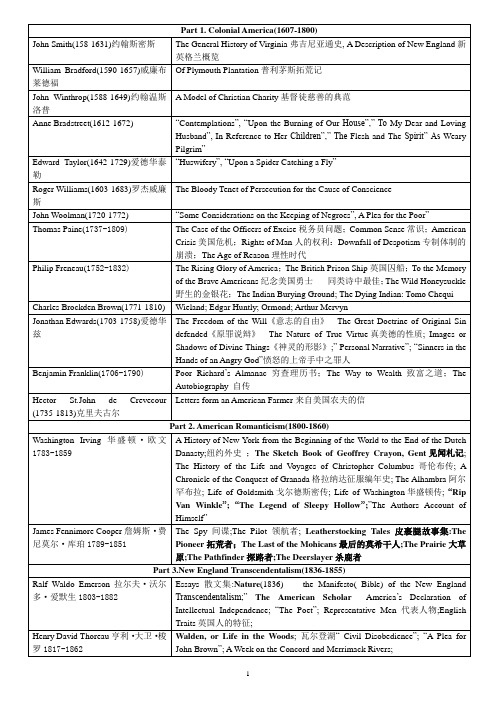
- 1、下载文档前请自行甄别文档内容的完整性,平台不提供额外的编辑、内容补充、找答案等附加服务。
- 2、"仅部分预览"的文档,不可在线预览部分如存在完整性等问题,可反馈申请退款(可完整预览的文档不适用该条件!)。
- 3、如文档侵犯您的权益,请联系客服反馈,我们会尽快为您处理(人工客服工作时间:9:00-18:30)。
ReconstrBiblioteka ction (After the Civil War)
Reconstruction brought the end of slavery and citizenship for the former slaves (but they later became second-class citizens under a "Jim Crow" system of segregation) While the South remained poor and torn apart from the war, the North and the West experienced great prosperity and economic growth
After the USSR broke up in 1991, USA became the only superpower Although there are other strong UN countries in Europe and Asia, America doesn’t always listen to them:
American History Timeline
1917-1918: US involved in World War I 1920: Women gained the right to vote 1920s: Time of great economic prosperity and speculation; era of political/labor/social reform 1929: American stock market crash 1930s: The Great Depression – unprecedented poverty and unemployment 1943-1945: US involved in World War II
American History Timeline
1865-1918: 27.5 million immigrants arrived from Europe 1900: The Progressive Era - women gained more rights and education, society, and the government were reformed The average annual income of non-farm workers grew by 75% from 1865 to 1900, and then grew another 33% by 1918
Time period: 1861-1865 Participants: The Union and The Confederacy Winner: The Union
American Civil War
Abraham Lincoln, known for being against slavery, was elected as president in 1861 11 states (South Carolina, Mississippi, Alabama, Louisiana, Florida, Texas, Georgia, Virginia, North Carolina, Tennessee, and Arkansas) announced that they were breaking away from the U.S. (―The Union‖) and forming their own pro-slavery alliance, the Confederate States of America (―The Confederacy‖)
both built up their military power spied on each other provided money and support to groups in Korea, Vietnam, Middle East, etc.
America as a Superpower
American History (1849-Present)
Immigration
In the 1840s and 1850s 4.2 million immigrants came to America from Europe (mainly Ireland and Germany) The Irish wanted jobs and new opportunities while the Germans sought political freedom
The Cold War
After World War II, there were two superpowers: USA and USSR
democratic USA, communist USSR
There was constant tension, but never actual war:
Atomic bomb
The Depression
20th Century Wars
World War I World War II Korean War (1951 - 1953) Vietnam War (1964 - 1975) Gulf War (1990 - 1991) Kosovo War (1999)
A Whipped Slave’s Scars
American Civil War
Causes:
Disagreement over slavery States’ rights versus federal control Northern and Southern nationalism Economics
Abolitionist Movement
The Abolitionists believed slavery was cruel and immoral They were mostly relatively wealthy Northern Republicans Eventually they led to the end of slavery in the North They were fiercely opposed by Southern Democrats who relied on slave labor to run their cotton plantations At this time 95% of American blacks lived in the South where they made up one-third of the population
President Abraham Lincoln
Civil War Results
The Confederacy's 3.5 million blacks were all freed by the Emancipation Proclamation The war produced about 1,030,000 casualties (3% of the population), including about 620,000 soldier deaths—two-thirds by disease The war accounted for roughly as many American deaths as all American deaths in other U.S. wars combined
USA refused to sign the Kyoto Protocol on greenhouse gases USA attacked Iraq without UN approval
